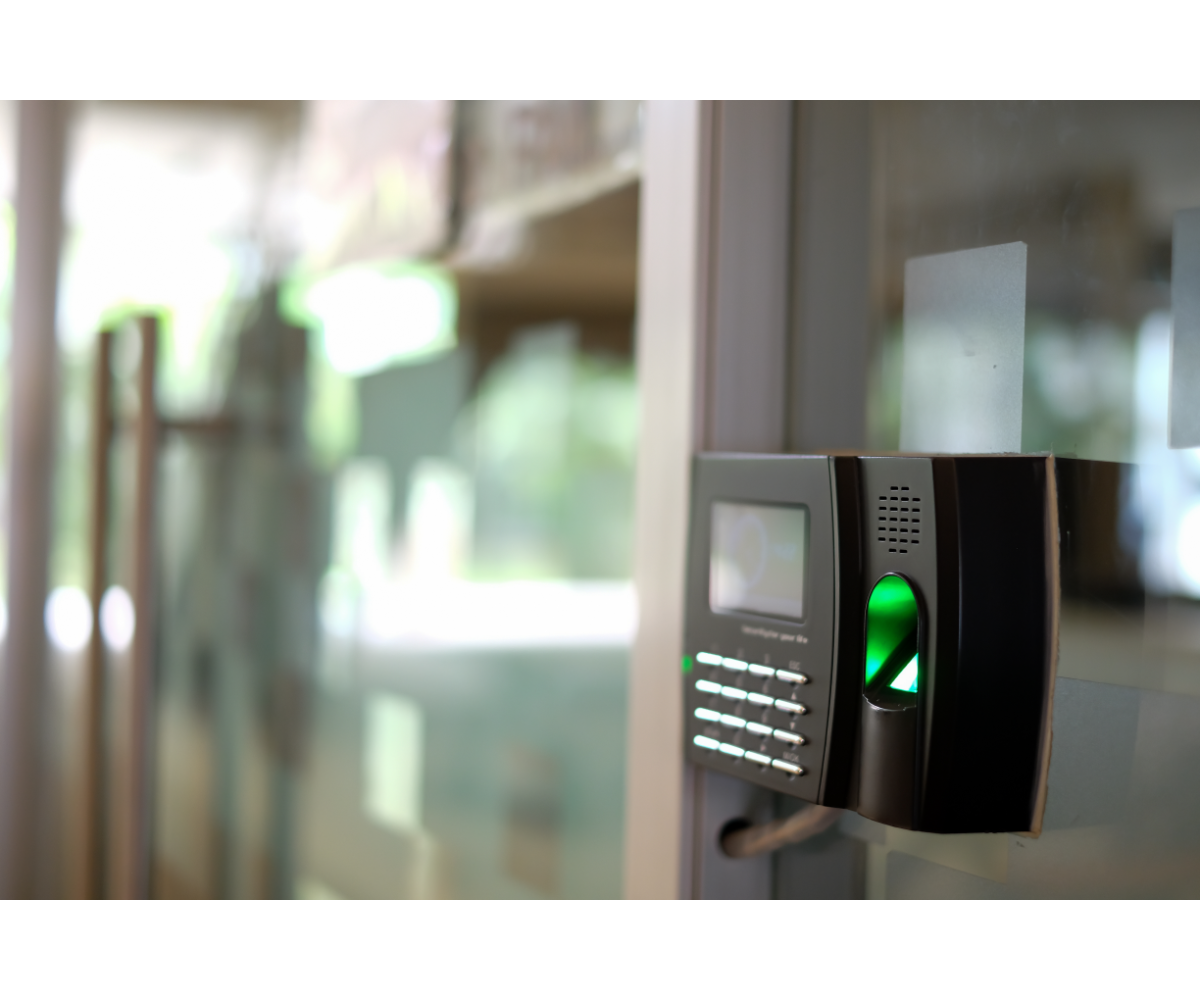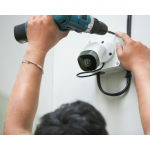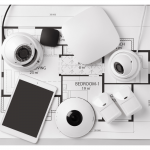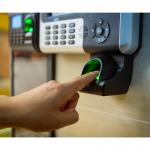As a home security equipment expert, I can tell you that one of the most effective ways to keep your home safe is by using biometric security systems. These advanced security technologies use unique physical characteristics to grant access to your property or secure specific areas in your home.
Biometric security systems are becoming increasingly popular due to their high accuracy and convenience. They eliminate the need for keys or codes, as they rely on biological traits such as fingerprints, facial recognition, and even iris scans to identify individuals authorized to enter certain spaces within your home.
In this article, we will explore the different types of biometric security systems available today and how they can enhance the protection of your home and loved ones.
Understanding Biometric Security Systems
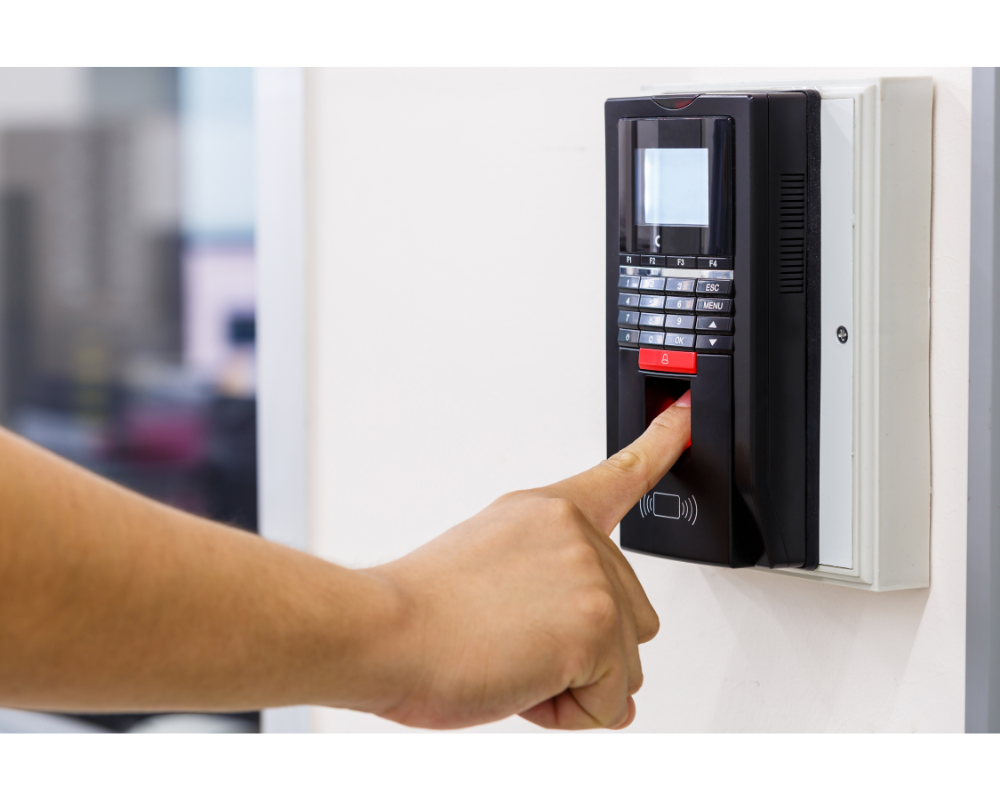
Biometric security systems are among the most advanced and sophisticated home security equipment available today. These systems utilize unique biological characteristics to identify and authenticate individuals, providing an unparalleled level of protection for homes and their inhabitants.
Biometric security applications have evolved significantly over the years, with fingerprint scanners being one of the earliest forms of biometric authentication. Today, however, numerous types of biometric security systems are available on the market. Some use facial recognition, while others rely on voice or iris scans to verify identity.
Despite their impressive capabilities, some homeowners may still have concerns about using biometric security systems in their homes. Privacy is a common concern when it comes to these systems – homeowners worry that sensitive information such as fingerprints or other personal data could fall into the wrong hands. However, it’s important to note that modern biometric technology has advanced significantly in recent years, making it more secure than ever before.
How Biometric Security Systems Work
Biometric security systems are becoming increasingly popular in modern homes. These devices use unique biological characteristics such as fingerprints, facial recognition, and iris scans to authenticate access.
Biometrics has several advantages over traditional security methods like passwords or PINs. One advantage is that biometric data cannot be easily replicated or stolen. It provides a higher level of security than other authentication methods. Biometric security systems can also reduce the need for physical keys or cards, which can be lost or stolen. Instead, all you need is your own body part of gaining entry into your home.
Application areas for biometric security systems include residential properties, commercial buildings, government facilities, and even vehicles. Future developments will likely focus on improving accuracy and speed while reducing costs. Soon enough, we may see more sophisticated biometric technologies being used by homeowners to secure their valuables and protect their families from intruders.
As technology continues to evolve at an unprecedented pace, homeowners need to stay ahead of potential threats with advanced security measures like biometrics. With its ability to provide personalized identification that is difficult to replicate, it’s no surprise why many people are turning towards this solution for their home protection needs.
Advantages Of Biometric Security Systems
Biometric security systems are becoming increasingly popular for home security and with good reason. They offer unparalleled accuracy in identifying who can access the property and are incredibly convenient to use. Plus, they’re surprisingly cost-effective too!
Accuracy-wise, biometric systems are hard to beat, as they use unique physical characteristics like fingerprints to verify identity.
Convenience-wise, they’re much faster than traditional systems, as you don’t have to fumble around for a key or type in a code.
Cost-effectiveness-wise, they can be much cheaper than other forms of home security equipment in the long run.
Accuracy
Imagine coming home from a long day at work, tired and ready to relax. You reach for your keys to unlock the door when suddenly you realize you left them on your desk at the office. Frustrated, you remember that you installed a biometric security system in your home just last week. With a simple scan of your fingerprint, the door unlocks, and you can enter the safety of your home.
One advantage of biometric security systems is their high level of accuracy. Biometrics uses unique physical characteristics such as fingerprints, facial recognition, or iris scans to ensure that only authorized individuals have access to secured areas.
Unlike traditional methods like passwords or key cards, which can be stolen or shared, biometrics provide an added layer of protection against potential breaches. This increased accuracy also translates well into applications beyond personal residential homes, such as government buildings or financial institutions where sensitive information needs to be protected.
However, it’s important to note that there are limitations to biometric technology. Certain factors, such as dirt on fingers or changes in facial appearance due to aging, can impact the system’s accuracy. Additionally, some people may not have clear enough prints or features for proper identification leading to false negatives.
These limitations must be considered when implementing biometric security systems so that they are used effectively and efficiently without compromising safety measures.
In conclusion, while biometric security systems offer numerous advantages, including heightened accuracy compared to traditional security methods, it’s important to understand their limitations before making any decisions regarding implementation. By considering both the benefits and drawbacks of this type of home security equipment, homeowners can make informed choices about how best to protect themselves and their loved ones within their living spaces.
Convenience
Now that we’ve discussed the high level of accuracy biometric security systems offer let’s focus on another advantage: convenience. With smart home integration becoming more common, biometrics can be seamlessly incorporated into a homeowner’s daily routine.
No longer do you need to fumble for keys or remember complicated passwords; scan your fingerprint or face and gain access with ease. This user experience saves time and eliminates the frustration often associated with traditional security methods.
Additionally, since biometric data is unique to each individual, there’s no need to worry about family members losing their key cards or accidentally sharing passwords. Each person in the household has their own personal identifier making it easy for everyone to come and go as they please without compromising safety measures.
Overall, when considering the advantages of biometric security systems, convenience should not be overlooked. The ability to seamlessly integrate this technology into everyday life while providing heightened levels of security creates an optimal solution for homeowners looking to protect themselves and their loved ones within their living spaces.
Cost-Effectiveness
Now that we’ve covered the convenience of biometric security systems let’s move on to another important advantage: cost-effectiveness. While some may assume that this advanced technology would come with a hefty price tag, it’s quite affordable and offers long-term savings.
Firstly, the installation process for biometric security systems is typically straightforward and requires minimal labor costs compared to traditional lock-and-key methods. Additionally, since each individual has their own unique identifier in the system, there’s no need for costly key duplication or replacement if lost or stolen.
Furthermore, maintenance requirements are also low as most biometric devices only require occasional wiping down and software updates. This eliminates the need for regular repairs or replacements associated with conventional locks and keys, which can add up over time.
Overall, when considering all factors, such as installation, maintenance, and ongoing expenses, biometric security systems offer an excellent return on investment while providing unparalleled levels of safety and protection within the home.
Types Of Biometric Security Systems
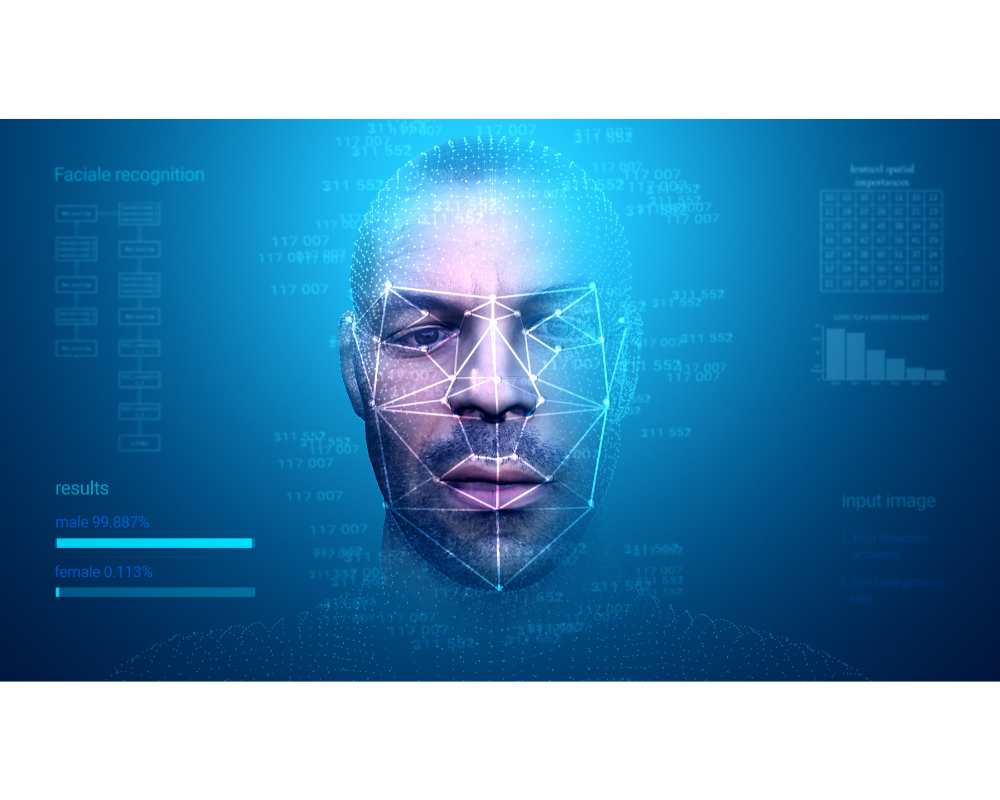
Imagine having a lock that could recognize and identify you based on unique physical characteristics such as fingerprints, facial features, or even voice. Biometric security systems are like the keys to your home but with added layers of protection.
These systems use biometrics to verify an individual’s identity before granting access to restricted areas in your home. Biometric security applications have been around for years and continue to grow in popularity due to their superior accuracy compared to traditional key locks.
With advancements in technology, biometric security trends now include more affordable options, making it easier for homeowners to adopt this type of enhanced security. Here are three types of biometric security systems commonly used by homeowners:
Fingerprint recognition: This system scans a person’s fingerprint and matches it against saved data before allowing entry.
Facial recognition: Cameras capture images of a face and compare them with pre-stored data before granting access.
Voice recognition: This system uses vocal patterns to authenticate a user’s identity before opening doors or gates.
Incorporating any one of these biometric security systems into your home can help increase your level of safety while providing unparalleled convenience at the same time. As technology continues to evolve, we look forward to seeing how biometric security trends will shape the future of home security equipment.
Fingerprint Recognition Systems
Fingerprint recognition systems are an innovative form of biometric security that use a person’s unique fingerprints to authenticate their identity.
These systems use fingerprint scanning technology to capture the unique patterns of a person’s fingerprint and store it in the system for later authentication.
The authentication process is quick and easy, as the system checks the stored fingerprint against the one being presented to identify the user.
This authentication method offers numerous security benefits, such as providing a high level of accuracy and efficiency and a greater level of privacy than other forms of authentication.
With fingerprint recognition systems, we can ensure that only authorized personnel access our security systems.
Fingerprint Scanning Technology
Imagine a world where you don’t have to worry about losing your keys or forgetting your password. With the advancements in biometric security systems, such as fingerprint scanning technology, this dream is becoming a reality for many homeowners. Fingerprint recognition systems are becoming increasingly popular due to their convenience and reliability.
Fingerprint scanning technology has various applications that make it an ideal option for securing homes. One of its most significant uses is providing access control to restricted areas within the house, such as gun safes or home offices. Moreover, unlike traditional security measures like passcodes and keys, fingerprints cannot be easily replicated or shared with others.
However, there are some limitations when using fingerprint recognition systems for home security equipment. For instance, individuals with sweaty fingers may face difficulty getting accurate readings from the scanner. Additionally, cuts or burns on fingers can also affect accuracy levels.
Nevertheless, these limitations do not take away from the overall efficiency of fingerprint scanning technology in home security applications.
In conclusion, fingerprint recognition systems offer homeowners peace of mind by enhancing their home’s safety through advanced biometric security measures. Despite some minor limitations, they remain one of the best options available for ensuring maximum protection against intruders while maintaining the utmost convenience and ease of use for residents.
Authentication Process
Now that we have discussed the benefits of fingerprint recognition systems let’s discuss how they authenticate users. The authentication process ensures that only authorized individuals can access restricted areas or devices within the home.
Fingerprint scanning technology uses biometric security measures to verify a user’s identity and grant them access. Fingerprint recognition systems employ the same biometric security used in mobile devices and banking systems for homes.
This means that the scanners use unique physical characteristics like fingerprints to identify users accurately. Since no two fingerprints are alike, this method provides an additional layer of security beyond traditional passwords or keys.
During the authentication process, the scanner captures an image of the user’s fingerprint and compares it with stored data to confirm their identity. If there is a match, access is granted; if not, entry is denied.
This process ensures maximum protection against unauthorized access while providing ease of use for residents who need quick and secure access to restricted areas or devices within their homes.
Security Benefits
Now that we have discussed how fingerprint recognition systems authenticate users let’s talk about the security benefits of this technology.
One significant advantage is its integration with smart home technology. Fingerprint scanners can easily be integrated into a smart home system, allowing residents to control access to various areas and devices within their homes through one central platform. This makes it easier for homeowners to manage who has access to restricted areas or devices while also providing an additional layer of protection.
Another key benefit of fingerprint recognition systems is the cost-effectiveness of biometric security compared to traditional methods like keys or passwords. While initial installation costs may be higher, the long-term savings on maintenance and replacements make biometric security a more affordable option in the long run. Additionally, these systems eliminate the need for rekeying locks or resetting passwords when someone loses their access credentials, saving time and money.
In conclusion, fingerprint recognition systems offer numerous security benefits for homes beyond traditional forms of authentication. By integrating with smart home technology and providing cost-effective biometric security measures, they provide maximum protection against unauthorized access while still being easy to use for authorized residents.
With these advantages in mind, it’s no wonder many homeowners are turning towards fingerprint recognition systems as a reliable form of home security.
Facial Recognition Systems
Facial recognition systems are a type of biometric security system that uses advanced algorithms to identify individuals based on their facial features. These types of systems have become increasingly popular in recent years due to their high accuracy and convenience.
Facial recognition technology is used for various applications, including access control, surveillance, and authentication. One major concern with facial recognition systems is privacy. Some people worry about the potential misuse or abuse of these technologies, particularly by governments or other organizations with authoritarian tendencies.
In addition, there are concerns about data breaches and hacking attacks that could compromise sensitive information stored within these systems. Despite these concerns, facial recognition systems continue to be widely used in many application areas.
For example, they are commonly used in airports and other transportation hubs to screen passengers for security purposes. They can also be found in retail stores and shopping malls as part of customer tracking programs designed to help businesses better understand consumer behavior patterns.
Overall, while there may be some valid privacy concerns associated with facial recognition technology, its benefits cannot be ignored when it comes to improving home security measures.
Iris Recognition Systems
Iris recognition systems are becoming increasingly popular in the world of home security. Combining advanced biometric technology with user-friendly interfaces, these systems offer a high level of security that is difficult to replicate with traditional methods. Iris recognition systems are more reliable than fingerprint and facial recognition systems.
One of the key advantages of iris recognition systems is their integration with smart home devices. This means that homeowners can easily monitor and control their security system from anywhere, using their smartphone or tablet. For example, you could receive an alert on your phone when someone tries to enter your home without permission and then use your device to lock doors or activate alarms remotely.
Compared to traditional security systems such as locks and keys, iris recognition systems offer several significant benefits. With traditional methods, it’s easy for intruders to bypass locks or copy keys – but this isn’t possible with biometric technology. Additionally, while passwords and PINs can be forgotten or stolen, our eyes cannot be replicated or lost like other forms of identification.
Overall, if you’re looking for a highly secure and convenient way to protect your home, an iris recognition system may be right for you. By integrating with smart home devices and offering superior reliability compared to traditional methods, these systems provide peace of mind that is hard to put a price on.
Hand Geometry Recognition Systems
Hand Geometry Recognition Systems are one of the most reliable biometric security systems. This technology uses the size and shape of a person’s hand to identify them, making it nearly impossible for intruders to bypass the system. Hand geometry recognition is commonly used in high-security areas such as government buildings, banks, and research facilities.
Applications of hand geometry recognition extend beyond just physical security. It can also be used for time and attendance tracking, access control, and even cashless payment processing. The accuracy rate of this biometric system is exceptionally high at 99%, which makes it more reliable than other biometric technologies like fingerprint or facial recognition.
A comparison of hand geometry recognition with other biometric systems reveals that it stands out due to its ease of use and low error rates. Unlike fingerprints, which may not be easily read if hands are wet or dirty, hand geometry recognition works well under these conditions. Additionally, facial recognition can fail if there are changes in lighting or if someone wears glasses or a hat. On the other hand, hand geometry recognition doesn’t require any special preparation from users.
Listed below are some key benefits of using Hand Geometry Recognition Systems:
- Highly accurate identification
- Easy to use without requiring special preparation from users
- Effective in wet or dirty environments
- Applicable to various applications beyond physical security
Overall, Hand Geometry Recognition Systems offer unparalleled reliability and versatility compared to other biometric technologies available today. As an expert in home security equipment installation and maintenance, I highly recommend considering this option for your home security needs.
Voice Recognition Systems
Voice Recognition Systems have become increasingly popular in the field of home security equipment. This type of biometric security system utilizes a person’s unique voiceprint to allow access into their homes. With its advanced technology, it is nearly impossible for anyone else to mimic someone else’s voice and gain entry without permission.
When comparing Voice Recognition Systems with traditional security systems, there are several key differences worth noting. Firstly, unlike traditional locks, which can be picked or bypassed through other means, Voice Recognition Systems provide an added layer of security that cannot be easily compromised. Additionally, these systems offer seamless integration with smart homes, allowing homeowners to control various aspects of their homes from a single device.
Overall, the advantages offered by Voice Recognition Systems make them an excellent choice for individuals seeking top-notch home security. By utilizing cutting-edge technology and offering superior protection compared to traditional methods, they represent the future of home security equipment. As such, those looking for reliable ways to protect themselves and their loved ones should seriously consider investing in this innovative solution.
Choosing The Right Biometric Security System For Your Home
Now that we’ve discussed voice recognition systems let’s move on to the topic of biometric security systems. Biometrics refers to methods used for recognizing individuals based on their unique physical or behavioral characteristics, such as fingerprints, facial features, or iris patterns.
When it comes to choosing a biometric security system for your home, there are several factors you need to consider.
The installation process is one of them. Some systems require professional installation, while homeowners can easily install others. If you’re uncomfortable with doing it yourself, hiring a professional may cost more but will ensure proper installation.
Another factor to consider when selecting a biometric security system is maintenance cost. You want to ensure that the system you choose fits within your budget and has no hidden costs. This includes regular maintenance check-ups and repairs if needed. Make sure the manufacturer offers good customer support in case anything goes wrong.
Ultimately, investing in a biometric security system adds an extra layer of protection for your home and loved ones. When making this investment, consider both the installation process and long-term maintenance cost to enjoy peace of mind without breaking the bank.
Frequently Asked Questions
How reliable are biometric security systems?
When it comes to biometric security systems, there are both advantages and limitations to consider.
On the one hand, these systems use unique biological traits such as fingerprints or facial recognition to identify individuals and grant access, making them difficult for intruders to bypass.
However, they can also be expensive and may not always work reliably if the technology fails or is compromised.
Compared with traditional security systems like keys or passwords, biometrics offer a higher level of security but require more investment upfront.
As a home security equipment expert, I recommend considering all options carefully before deciding on the best system for your needs.
Can biometric security systems be hacked?
Biometric security technology has become increasingly popular in recent years, with many homeowners opting for fingerprint or facial recognition systems to keep their homes safe.
While these devices may seem foolproof, there are still risks associated with biometric security systems that should be considered. One of the biggest concerns is the potential for hacking.
Like any other electronic device, biometric security systems can be vulnerable to cyber attacks if not properly secured. It’s important to work with a reputable home security equipment provider who understands these risks and can help you choose a system that will provide maximum protection for your home and family.
Do biometric security systems require maintenance?
Maintaining biometric security systems is highly recommended for optimal functioning. Just like any other electronic device, these systems require regular upkeep to ensure they operate smoothly and efficiently.
Neglecting maintenance may result in the system malfunctioning or becoming less effective over time. Therefore, it’s essential to understand the importance of keeping up with routine maintenance as it not only increases its lifespan but also benefits homeowners by providing reliable home security around-the-clock.
As a home security equipment expert, I recommend scheduling regular check-ups with your service provider to keep your biometric security system running at peak performance levels.
Are biometric security systems affordable for average homeowners?
When considering the cost-effectiveness of home security equipment, it’s important to weigh your options.
While biometric security systems offer advanced technology and reliable protection, they may not be affordable for average homeowners.
Alternative options, such as a traditional keypad or key fob entry, may provide a more budget-friendly solution without sacrificing safety measures.
It ultimately depends on your specific needs and budget when deciding which type of home security equipment is right for you.
As a home security expert, I recommend evaluating all available options before making a decision.
Are biometric security systems legal in all states/Countries?
As a home security equipment expert, it is important to address the legal implications and privacy concerns surrounding biometric security systems.
While these innovative technologies are becoming increasingly popular for their ability to provide highly secure access control solutions, it is crucial to note that there may be restrictions on their use in certain states or countries.
As such, those considering investing in biometric security systems should research local laws and regulations before making any purchases or installations.
Additionally, given the sensitive nature of the personal data collected by these systems, homeowners must take steps to ensure adequate protection against unauthorized access or breaches.
Embracing Innovation: The Power of Biometric Security in Your Home
In conclusion, as a home security equipment expert, I highly recommend biometric security systems for homeowners who want peace of mind and top-notch protection.
These systems are incredibly reliable due to their ability to accurately identify individuals using unique physiological features such as fingerprints or facial recognition.
While some may question the potential vulnerability of these systems, it is important to note that they have proven nearly impossible to hack.
Additionally, maintenance requirements are minimal and affordable for most homeowners.
Biometric security systems may seem like an expensive investment at first glance, but they are becoming increasingly accessible and affordable for average households.
As with any home security system, it is important to check local regulations regarding the use of biometric technology in your area.
Overall, biometric security systems offer unparalleled protection and convenience when it comes to safeguarding your home and loved ones.
Trust me when I say that investing in this type of cutting-edge technology will provide you with peace of mind knowing that your household is secure from unwanted intruders.

